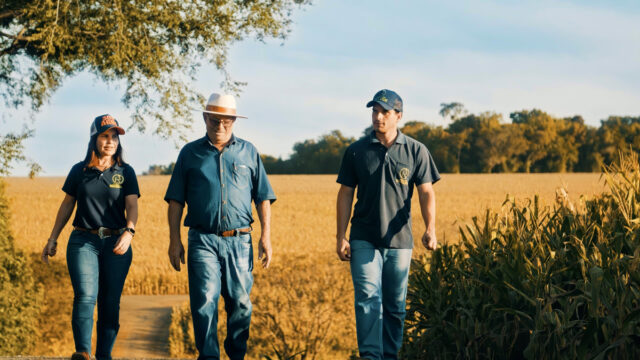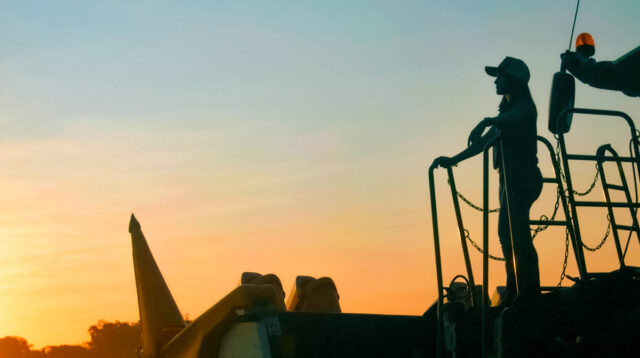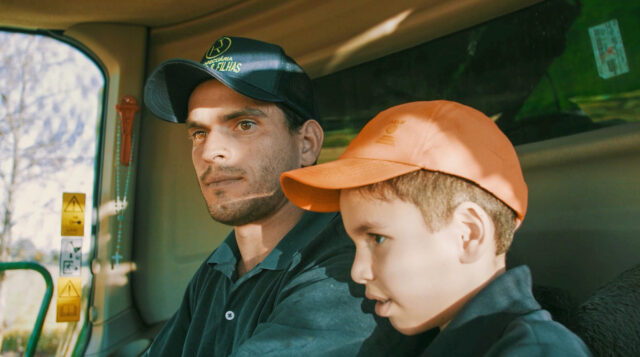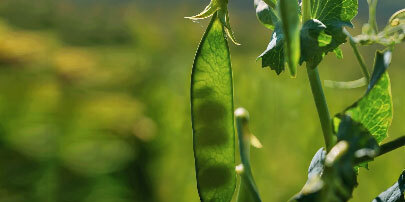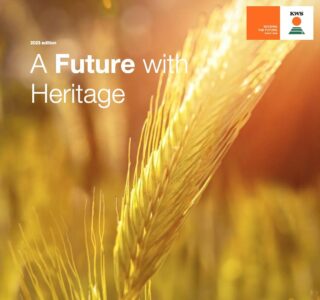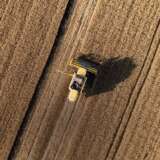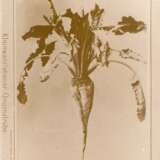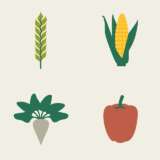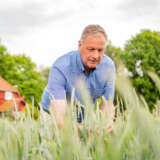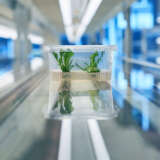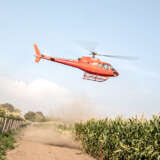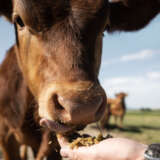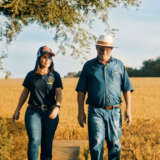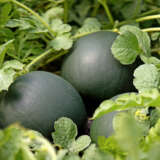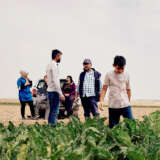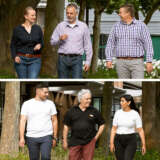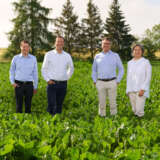The preeminent farmer from Paraná!
Carla Rossato is leading her family farm into the future with courage and foresight.
Muggy heat settles over Sertaneja and Santa Mariana. The two small towns in northern Paraná, a state in southern Brazil, are surrounded by fields abounding with plants that have long since grown accustomed to the predominantly humid tropical climate. Corn and soybeans draw strength from the reddish and fertile loamy soil — the Terra Roxa — which is typical of this region. The flourishing agriculture found here is also due to a woman who has prevailed in a domain dominated by men: With her energy and drive, Carla Sanches Rossato inspires other women in farming, wins awards for her farming management skills and uses her forward-looking ideas to successfully continue her family’s farming operations into its third generation.
“I’ve always loved farming.” It’s a statement that describes Carla Rossato’s life in just a few words. Even as a little girl, her parents’ farm was the place she felt most contented. During her school years, Carla used every spare minute to be out in the field — riding a horse among cattle and cows, driving a tractor as young as age seven, sitting behind the wheel of the farm’s pickup truck as a teenager to run errands: That was her childhood and youth.
And nothing about any of that has changed so far. Carla’s veterinary-medicine degree reflects her passion for animals, but the university education didn’t stop her from wanting to follow in her parents’ occupational footsteps: “I’ve always tried to emulate my father,” Carla says. Her family’s agricultural tradition stretches back more than half a century. Her father, José Roberto, and her mother, Deusa, bought their first plot of land in the mid-70s. Today the Rossatos work with four other family members and twelve employees to cultivate many hectares of land in several locations. The Marambaia farm has been growing soybeans and corn since 2012. The operation also maintains an environmental reserve with 268 hectares of land. The farms Bom Jesus and São José run a livestock breeding operation and grow soybeans as well as corn. The successful development of the Rossato family’s farming operations can also be attributed to the important role agriculture plays in the Brazilian economy: The agricultural industry employs nine percent of the South American country’s population and currently accounts for round about 25 percent of Brazil’s GDP. One of the largest producers of soybeans, sugar cane, corn, coffee, poultry and beef on the planet, Brazil supplies a major share of the world’s food.
#ThinkingInGenerations: Sanches Farm, Brazil
Agreeing to be part of the family succession was my decision. I didn’t see it as an obligation. My father is still involved. He’s the one still by my side to this day.
Carla Sanches Rossato | Farmer from Paraná
Hard work and rich learnin
Carla has been instrumental in evolving her family’s farming operations since the early 2000s when she officially joined the business after completing her university studies. When she started, Carla didn’t enjoy a daughter bonus: She received a negotiated salary, no special privileges, and the same standard workday like all the other farm employees. “I’ve worked hard, and my father has treated me like the other workers,” Carla says. At the same time, she also felt the trust her parents extended to her from the start; they gave her the space and freedom to develop. Carla assumed management of the farm more than twelve years ago, saying this about the step: “Agreeing to be part of the family succession was my decision. I didn’t see it as an obligation. My father is still involved. He’s the one still by my side to this day.” The strong results she has achieved attest to the trust her parents have extended to her: “Over the years, Carla has continued the work we started and she has perfected it,” her parents proudly say, acknowledging their daughter’s hard work.
Not one to rely on chance, the 46-year-old constantly reads and researches and tries to fully inform herself. Before she starts growing a variety, Carla carries out tests, stating: “I only expand the cultivation area when I see the results I want.” This approach has helped her successfully win over her father when wanting to introduce new practices or ideas. “It wasn’t that he didn’t accept my ideas,” Carla recalls. “But I did have to prove why I wanted to do something, why this would benefit us and how we would profit even more from doing it.” In a reflection of this, Carla has been growing varieties from KWS on some of the Rossato family’s fields. The seed specialist KWS launched its activities on the Brazilian market in 2012 and has seen its market share in corn seed rise from around three percent to about ten percent since then. That makes KWS the fastest-growing brand in the Brazilian market for the third consecutive year! In particular, Carla relies on “K9606 VIP3”, a corn hybrid that demonstrates especially high yield stability and is currently the most commonly grown hybrid in Brazil.
Carla considers healthy soil to be the foundation of a successful harvest, which is why she analyzes the farming operations’ soils throughout the year. “There’s no point in using the best fertilizer if the soil isn’t balanced enough to absorb and retain the nutrients from the fertilizer,” says Carla, who considers the advancements made in technology and digitalization to be the greatest transformations in agriculture over the past few years. Progress can improve a great deal, but even the best technology is of little use if the soil remains imbalanced, she points out.
A role model for other women
Carla’s far-sighted approach and continuous drive to innovate have earned her a reputation as an expert — a reputation that extends beyond the borders of Paraná. In 2022, the trailblazing farmer won the “Producer 4.0” award at AgroBIT Brasil. “I find innovation and technology exciting,” she says. “My goal is to use a digital approach to monitor and sustainably boost production on our property — and to do this with lower costs and the correct application of inputs. All our machines are fully networked today.” Carla also received the 2019 Women of Agro Award for her capable management work, saying about it: “This award has demonstrated to me all that I’ve accomplished. It’s important to show that everything we do does make a difference.” Carla also attributes her success to the support she’s received from her parents: “This isn’t for women” has never been a statement uttered by her father. “On the contrary, he’s always taken me with him and made a point of teaching me.” She’s now become a role model for other female farm operators, and young female farmers come to her for advice and support. “I always try to help,” says Carla, who sees the increasing number of women joining the agricultural industry in Brazil in a thoroughly positive light: “Agribusiness has taken a huge leap in terms of technology, innovation and sustainability, especially in my region, thanks to dedicated women,” she states, adding: “This is because women aren’t afraid to make mistakes.”
KWS Background
KWS breeding station in Petrolina:
Greenhouse under the open sky
Strong solar radiation, limited precipitation, low humidity: Dry heat is a constant feature of Petrolina, in north-eastern Brazil. Optimal conditions for KWS to grow plants there! The 89-hectare breeding station is one of more than 50 breeding stations KWS currently has worldwide. “It’s a greenhouse under the open sky,” explains Weber N. Moreira, Jr., Corn Breeding Director at KWS Brazil. After all, the special climate conditions in Petrolina make it possible to grow plants at the location all year round. The breeding station focuses on growing corn, sorghum, sunflower and vegetable crops. It aims to accelerate the development of new hybrids and offer ideally adapted varieties to farmers in Brazil and beyond. KWS engages in targeted plant breeding to both increase yields and boost sustainability and efficiency in agriculture by, for example, increasing plants’ disease tolerance while facilitating the reduced use of pesticides.
